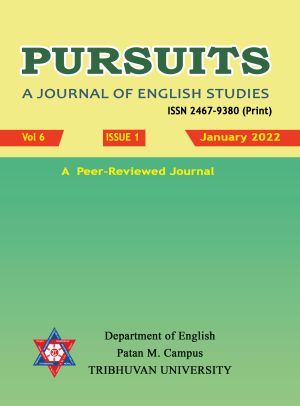Biophilia in Kiran Desai's Hullabaloo in the Guava Orchard
DOI:
https://doi.org/10.3126/pursuits.v6i1.46845Keywords:
Biophilia, Eco-criticism, Consciousness, Degradation, materialism, ecologyAbstract
This article explores biophilic consciousness in Kiran Desai’s novel, Hullabaloo in the Guava Orchard, from the perspective of Eco-criticism. The prime concern of this study goes to present the prevalence of biophilia representing through its main character, Sampath Chawla who escapes from the modern sense of materialism and human’s relationship with nature and others species, and comes up to the lap of nature where he gets complete happiness. Nature provides what he dreams to achieve in life. The orchard provides him shelter, animals become his friends, and nature provides him knowledge, freedom and peace putting forward the urgent need of maintaining harmonious relation between human, animals and nature. His dream of being a part of nature and its preserver gets symbolically fulfilled as he lives in the orchard with the monkeys, refusing every offer of his family. The study shows ultimate freedom, joy and happiness come from blending of human life with the nature suggesting us to go and enjoy carefully utilizing the nature. The researchers have employed eco-criticism and the eco-critics like Edward O. Wilson, Richard Kerridge and Chryll Glotfelty to form ecological ground for the analysis of the text showing much concern for perseverance, protection and promotion of the nature.




